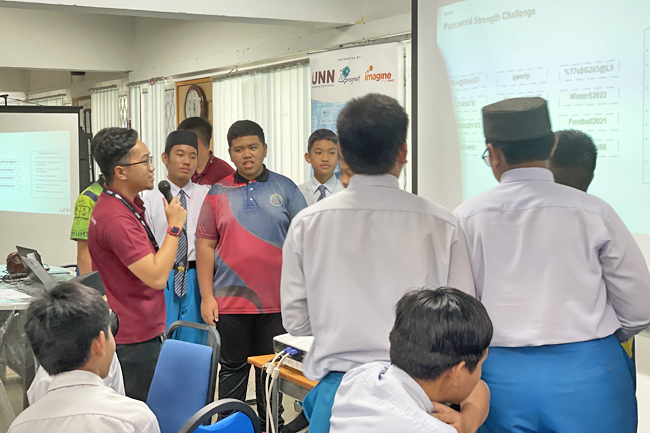Unified National Networks Sdn Bhd (UNN) is committed to strengthening its framework to protect the country and its data from cyber threats in response to the growing and evolving threat of cybercriminals, which has become a significant concern.
UNN Acting Chief Executive Officer Chris Phan said, “We build the infrastructure that connects people. Key and crucial to this equation is trust in the connectivity and reliable infrastructure we provide, enabling micro, small and medium enterprises (MSMEs) and other tech companies to be more innovative.”
To further support this commitment to providing a trusted ecosystem, UNN partnered with Big BWN Project, imagine Sdn Bhd and Progresif Sdn Bhd to address the significant gap found in digital literacy awareness among young people in Brunei Darussalam.
Belia Pintar Siber, a digital literacy programme, was curated as a collaborative effort to educate primary and secondary students nationwide on how to protect themselves from cyberbullying and scams, empowering them to become digitally resilient.
The programme was conducted as an effort to promote STEAM (science, technology, design and technology, art, engineering and mathematics) education under the Ministry of Education’s (MoE) Science, Technology and Environment Partnership (STEP) Centre.
The students were taught about online safety, misinformation, cyberbullying awareness, identifying scams and ethical digital behaviour. These critical topics align with the Belia Pintar Siber programme’s objectives of equipping youth in schools nationwide with essential digital skills, empowering them to thrive in an ever-evolving digital world. This programme also supports UNN’s continuous effort to bridge the digital divide and drive Brunei towards becoming a Smart Nation.
Big BWN Project Lead and founder Noor Hafizah Rashid said, “The engagement, enthusiasm and awareness sparked through this pilot phase highlight the urgent need to continue and expand the programme beyond May 2025.
“By expanding this initiative, we can reach more schools, refine the curriculum to tackle emerging digital challenges, and further enhance students’ ability to think critically, navigate online spaces safely, and contribute positively to the digital world.” – James Kon



